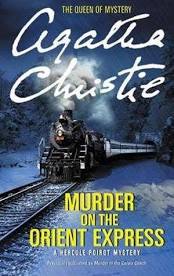Whenever I’m engrossed in a ripping yarn of murder, mystery and mayhem, I love spotting the devices the writer has used to keep me turning the pages. My all-time favourite device is a spine-tingling heterotopia, where the characters are trapped in one place.
I’ve long loved heterotopias, but only recently discovered that there’s a word for them! I can see Hercule Poirot putting his ‘little grey cells’ to work, breaking the word into two—hetero, meaning other (as in heterosexual), and topia meaning place (as in utopia, dystopia)—to deduce that heterotopia means other place. “You see, Hastings, the grey cells… they do not disappoint.”
Originally a medical term for body parts in the wrong place, a heterotopia in a story is an ‘other place’ that’s hard to get into and/or out of. Children’s stories abound with them (think Alice In Wonderland; and The Lion, The Witch and the Wardrobe), but of course writers of other genres love them too, especially in science fiction and fantasy.
You’re no doubt familiar with the classic heterotopia scenario in crime-writing. Atop a remote mountain or an island with rugged cliffs, there’s a crumbling mansion filled with estranged family members or an assortment of wealthy types, along with a few representatives of the working class, such as a maid, gardener, and much-loved governess. Everybody has deep dark secrets, and they’re all harbouring ill-intent towards someone. They’ve gathered at the behest of their host/ess for some spurious reason… but suddenly the road is swept away just before, or after, the inevitable murder occurs.
The distraught heterotopians, each terrified that they might be the next victim, can do nothing. They can’t leave, they can’t wait patiently for a fingerprint or DNA report, they can’t even phone for help, although Agatha Christie rather wickedly twists that notion in The Mousetrap. Instead, they must wait for the sleuth to unearth all the clues and everyone’s sorry past before the denouement (another classic device) in the study/garden/deceased’s bedroom, where she reveals the unpredictable truth.
 There are many variations of this, of course: the snow-trapped train in Christie’s Murder on the Orient Express is perhaps the most famous of all, and I’ve set most of the action in my upcoming novel on a remote farm where characters are trapped in a slightly different sense.
There are many variations of this, of course: the snow-trapped train in Christie’s Murder on the Orient Express is perhaps the most famous of all, and I’ve set most of the action in my upcoming novel on a remote farm where characters are trapped in a slightly different sense.
As readers, we instinctively know that eventually the road is reopened (or the snow melts, or the entrance to the tunnel is found), and life returns to normal. Weirdly, in this surreal coronavirus world, many of our homes are now heterotopias of sorts. Although not all of the heterotopic rules apply (I can go to the supermarket, and Houseparty/Zoom with friends and family), still I feel like a heterotopic cloud sits over us, as we hunker down and wait for life to return to normal.
So while we’re waiting for that to happen, dive into some great crime novels and short stories, and keep your eyes peeled for gripping and original heterotopias.
Lyn Yeowart is a freelance writer and editor, and manuscript assessor and editor. Her debut novel, The Silent Listener (Penguin Random House, early 2021), is a literary suspense thriller set in the dark gothic heart of rural Victoria. A long-time lover of crime novels and the many devices writers use to create suspense, intrigue, and gripping plots, she is currently plotting her second novel around a true-life crime, and planning a PhD in Creative Writing to explore heterotopias in modern Australian fiction.
